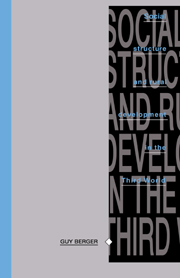1 - Development: defining the terrain
Published online by Cambridge University Press: 17 September 2009
Summary
Theory – its role and scope
A beautiful scene catches the eye – lushly covered units with mealies standing 2,4 metres high, ready to be picked. Cows grazed in the thick pasture.
(‘The New World of Keiskamma’, Daily Dispatch, 1 April 1977)This is a journalist's idyllic view of a rural development project in South Africa's Ciskei bantustan. In contrast, serious analysis needs to go beyond what Poulantzas (1976a: 68) calls ‘the noisy illusion of the evident’. Thus, numerous writers have argued for the necessity of theory, and against empiricism, on the basis that there is no ‘innocent’ investigation of reality. Whether he knows it or not, every social researcher uses generalisations and abstractions in identifying, selecting and ordering ‘the facts’. Empirical information does not exist as ‘raw data’ independently of more abstract assumptions.
However, the use of theory is no guarantee that the resulting knowledge corresponds accurately to reality. Firstly, while criteria may be proposed to validate the knowledge produced by a given theory, there is always the problem of validating these criteria in turn (Althusser, 1976: 137; 1970a: 56–7). Secondly, every theory bears the traces of social values that lend significance and ordering to phenomena in its field. The sociology of knowledge applies no less to development theory than to other theories, as shown, for example, in the discussion by Goodman et al. (1984) concerning the changing history of development theories in Brazil, and the study by Kitching (1985: 145–6) on the political context that underpins the debate around Kenyan development.
- Type
- Chapter
- Information
- Publisher: Cambridge University PressPrint publication year: 1992



